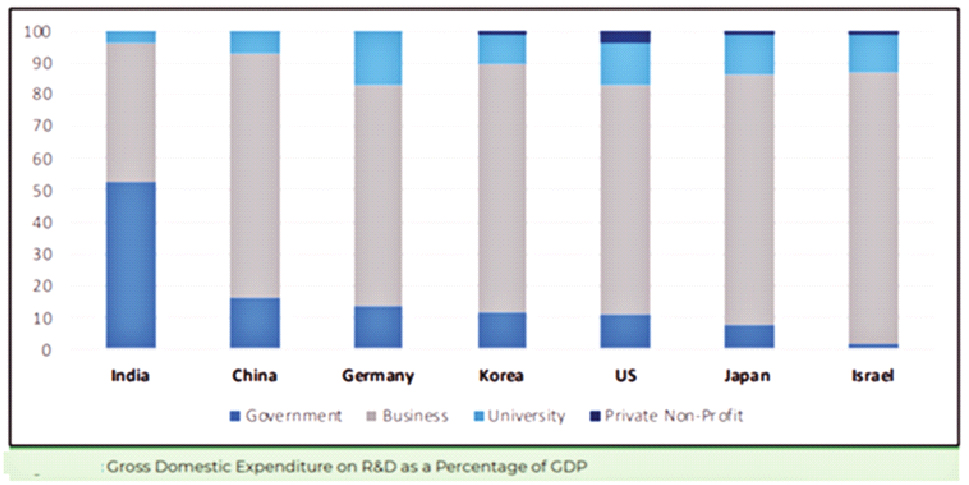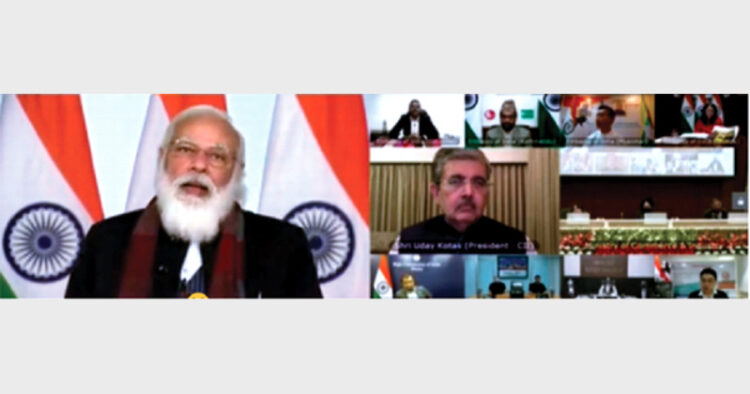On January 16, 2021, while addressing the ‘Prarambh: Startup India International Summit’, Prime Minister Narendra Modi announced Rs 1,000-crore ‘Startup India Seed Fund’ to support startups and help budding entrepreneurs pursue innovative ideas

Prime Minister Narendra Modi addressing the ‘Prarambh: Startup India International Summit’
In 2014, Bharat had only four startups in the unicorn club, but today there are more than 30. PM Modi highlighted that 11 startups entered the unicorn club in 2020 itself. India has the world’s third-largest startup ecosystem. There are over 41,000 startups in the country.
Going Global
The Startup India International Summit marks five years of the Startup India initiative’s launch, which has played a vital role in encouraging entrepreneurship spirit across India.
The Day One of the summit was dedicated to hosting BIMSTEC Startup Conclave. In his address, the Union Commerce and Industry Minister Piyush Goyal, encouraged Indian investors to look at the BIMSTEC region and work towards greater engagement through investment, mentorship, and support.
With involvement from over 25 countries and more than 200 global speakers, the summit was the largest startup confluence organised by India’s Government since the launch of the Startup India initiative.
Now, the Startup India initiative should embark on global outreach by helping Indian startups going global. The Startup India initiative already has around ten “International bridges” like India-Finland Tech Hub. The post-Covid world is looking for innovations, solutions, and entrepreneurs who can revive the economy and humanity’s survival. Now is the time to leverage India’s and Indian’s goodwill and global acceptance. Thus, the Startup India initiative should open global “handholding offices” to help Indian startups establish offices, collaborations, and partnerships.

“I see lot of potential for Indian startup solutions on global markets like Germany. For example, take Indian digital industrial IoT solutions to solve German established companies’ problems in digitisation. There are some great regional initiatives to promote Indian startups going global—it should be taken to the next level with channelled central support mechanisms and global co-operations like the German Indian Startup Exchange Program (GINSEP).” Julian Zix, Project Lead GINSEP, German Startups Association.
As per the National Association of Software and Services Companies, India’s software and services exports grew 8.1% to $147 billion in the fiscal year 2020. The value of software exports by units registered under Software Technology Parks of India (STPI) is projected to touch about Rs 1.20 lakh crore in the third quarter of the current financial year, a top official has said. This is 11.7% higher than around Rs 1.07 lakh crore worth of exports clocked by STPI-registered units in the corresponding period previous fiscal.
Amid the Covid-19 pandemic in which “work from home” is new normal, STPI should also initiate global outreach. For instence, STPI should allow global entrepreneurs to establish and manage a software company digitally—from anywhere in the world–without the need for travel. E-company registration will help global entrepreneurs to hire Indian software talents and boost software exports.
Vaccine Testimony to Scientists
While launching the nationwide Covid-19 vaccination drive on January 16 2021, PM Modi said: “In such a short time span, India has been able to develop two vaccines against Covid-19. This is a testimony to the scientific talent of our country. We have earned our credibility through our track record. Most children in the world get their vaccine shots from the vaccines made in India. The world’s trust is on our ‘Made in India’ vaccines will rise soon. The Indian Covid-19 vaccines are cheaper than foreign shots and are also easy to use. Some foreign vaccines cost close to Rs 5,000 per dose and need to be stored at -70 degrees Celsius.”
The PM also asserted that Bharat should also think of starting vaccine tourism for innovators and global entrepreneurs. Being the third-largest startup ecosystem globally, India should allow free and fast access to the global startup community by launching a liberal visa regime like startup visa, innovation visa and digital nomad visa.
FDI in R&D policy falls at the juncture between innovation policy and FDI policy. Accordingly, in recent years, the Government of India has announced numerous policies for making a favorable environment for FDI in R&D. Under the aegis of Industrial R&D Promotion Programme, Bharat is promoting R&D in industry, institutions, and scientific organisations
Amid the Coronavirus pandemic, India with the highest recovery rate and two vaccines with high efficacy should establish “Corona free global startup zones” for the global community. This will boost India’s service industry (like hotels, airlines etc.) along with the startup ecosystem
Pro-active Role
India presents a queer distinction from the rest of the world based on where most of the expenditure is raised for R&D. Figure shows that private spending in India towards R&D is seriously lacking. Compared to 77 per cent in China, the share of private expenditure towards R&D in India is merely 43.5 per cent.
So, the private sector needs to step up in driving the spirit of innovation forward in India. Meanwhile, the government spending should be diverted towards creating enabling factors for innovation in India, like creating a larger pool of human capital, ease of doing business—simple procedure for closure of start up/industries—and improving industry-academia linkages.
Although India has aggressive FDI policies to push domestic technological productivity, its innovation environment is primarily supported by the procurement of imported technologies and technology transfer agreements. As per the Department for the Promotion of Industry and Internal Trade (DPIIT), India has a steady inflow of FDI equity in traditional sectors such as services, ICT, pharmaceuticals/biotech, and automobile. Nevertheless, FDI in R&D is only 0.2%.
India presents a queer distinction from the rest of the world based on where most of the expenditure is raised for R&D. Figure shows that private spending in India towards R&D is seriously lacking. Compared to 77 per cent in China, the share of private expenditure towards R&D in India is merely 43.5 per cent. So, the private sector needs to step in to drive the spirit of innovation forward in India
As per UNCTAD, Globally, India has arisen as an attractive destination for greenfield FDI and MNC activities, mainly due to the accessibility of skilled human resources at lower wages. However, India’s innovation potential has hardly been tapped into by foreign multinationals. R&D-intensive manufacturing and utilising the science and technology (S&T) infrastructure by MNCs are prerequisites for strengthening the host economy’s innovative capabilities. However for last 30 years, India’s gross expenditure in R&D has festered amid 0.6- 0.9% of Gross Domestic Product.
GOI’s Key Intervention
FDI in R&D policy falls at the juncture between innovation policy and FDI policy. Accordingly, in recent years, the Government of India (GoI) has announced numerous policies for making a favorable environment for FDI in R&D. Under the aegis of Industrial R&D Promotion Programme (IRDPP), Bharat is promoting R&D in industry, institutions, and scientific organisations. Further, GOI announced many fiscal and financial encouragement schemes to fund R&D and scientific research. GOI’s key policy intervention include (i) tax benefits in R&D spending in DSIR-affiliated R&D centres, (ii) exemption of customs duty on goods imported for R&D by private and public research institutions, and (iii) exemption of central excise duty on purchase of goods for R&D. (The Science Policy Forum). Bharat currently needs to at least double the DSIR-recognised corporate R&D units. Further, startup ecosystem should be motivated to increase FDI in R&D.
Sustainable growth
Bharat principally requires a structural alterations directed by innovation and investment in Reserch and Development to achieve long-term sustainable and inclusive growth. As per PwC, to build a $10 Trillion economy, Bharat needs to increase its R&D spend to 2.4% of GDP by 2034, and focus on innovation-driven solutions that may account for almost 40% of the $10 Trillion Indian economy envisaged by 2034.
(The writer is the Founder & CEO, WUS (IIT-Kanpur incubated startup). And he is Pentland-Churchill fellow for Global Public Policy leadership at New York University (NYU) and University College London (UCL))














Comments